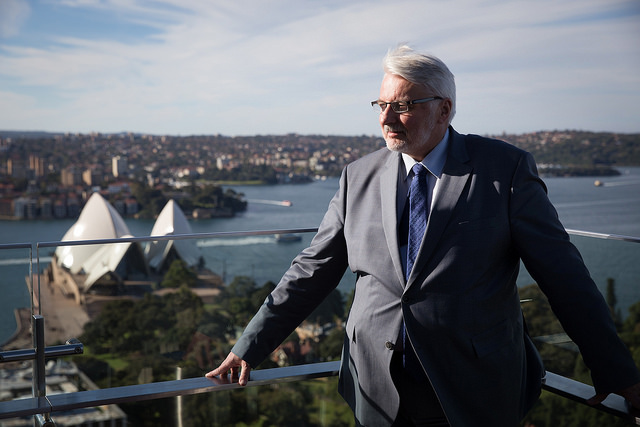
Welcome to The Strategist Six, a feature which provides a glimpse into the thinking of prominent academics, government officials, military officers, reporters and interesting individuals from around the world.
1. How concerned is Poland about the election of Mr Trump?
Poland and the US have a longstanding partnership and it’s in our joint interest to maintain stability and security across the globe. In his November 2016 phone conversation with President Duda, the then President-elect assured him that Poland could count on US cooperation across all areas. Earlier this year, I met with senior representatives of the new administration who reaffirmed the durability of transatlantic ties and the US commitment to the security of Europe and our region.
2. Given the negative comments Mr Trump has made about NATO and his apparent wish for a closer relationship with Russia, do you believe the US will reduce its support for NATO?
We should take a larger perspective while looking at President Trump’s statements on NATO. Past US presidents have urged their allies to engage more and to increase their contributions to the alliance. Poland is among the few NATO allies that spends 2% of GDP on defence. Its commitment to NATO is ironclad.
About 30,000 Polish troops joined the US and other allies in Iraq, Afghanistan and Kosovo. Today we’re part of the anti-ISIL coalition and remain committed to ensuring security in our part of the world. Soon, Poland will host a base which is part of America’s contribution to the NATO Ballistic Missile Defense system. We do our share.
We remain convinced that the Trump administration will stay fully engaged in ensuring security in Europe and implementing its commitments to its allies. The arrival of US troops in Poland and elsewhere in our region proves that transatlantic cooperation is crucial to the US.
3. Do you believe Mr Trump’s comments will embolden Russia and make the situation in Poland and the Baltic states more dangerous?
Any action that weakens the transatlantic alliance works in Russia’s favour. Because of the militarisation of the Kaliningrad Oblast, the situation is already dangerous. We must prepare for all scenarios, even the least probable ones. Yet, I remain convinced that our deterrence policy remains effective and has been further enhanced at the NATO Summit in Warsaw. Last month I met Secretary of State Rex Tillerson in Washington and I was assured that no change in US–Russia relations would be implemented at our expense.
4. Do you think Russia might use a nuclear weapon?
Poland consults with its allies on all security challenges, including Russian aggression, its military strategy and the posture of its nuclear forces. It’s in nobody’s interest, including Russia’s, to employ nuclear weapons. At the NATO Summit our leaders underlined that the fundamental purpose of NATO’s nuclear capability was to preserve peace, prevent coercion and deter aggression.
5. Has the situation in Eastern Europe become more dangerous?
We live in highly unpredictable times, when a nuclear superpower isn’t shy about using military force against its neighbours and doesn’t hesitate to present an aggressive posture towards the Euro-Atlantic community.
Russian aggression against Ukraine has ended the period of post-Cold War stability and undermined European security architecture. The upsurge of armed incidents in Donbas shows that Russia is ready to resume hostilities on a large scale at short notice. Russians use tanks to try to force others to the negotiating table. It’s important that the international community doesn’t turn a blind eye to Russia’s actions. Poland has stayed firm and unified in urging the Kremlin to implement international agreements.
6. What can Poland and the other European nations do about that?
Russia is responsible for this war and can end it. It invaded and still occupies parts of Ukraine. Territorial integrity and full sovereignty of Ukraine are key issues for European security. The EU and NATO must stand by them. At the NATO Summit we ensured political support to Ukraine and Georgia. The best way to project stability in Eastern Europe is by strengthening our partners’ resilience against external aggression.
Poland will continue to help reform and improve Ukrainian’s defence sector. With the US, Canada, and UK, we’re training Ukrainian soldiers in the Joint Multinational Training Group Ukraine. We also support the Ukrainian army through the Multinational Joint Commission involving the US, Britain, Canada and Lithuania. Ukraine’s participation in the trilateral Polish-Ukrainian-Lithuanian brigade will enhance interoperability and help bring Ukraine’s forces to NATO standards. Poland’s defence agreements with Kiev are a crucial beacon in our long-term commitment to make Ukraine more secure and prosperous.
We strongly support the efforts of the Organization for Security and Co-operation in Europe and the EU to stabilise the eastern neighborhood. Poland is one of the biggest contributors to the EU Monitoring Mission to Georgia and the OSCE Special Monitoring Mission to Ukraine.

